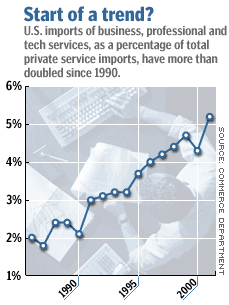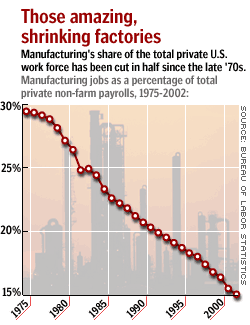 CHRIS HILDRETH FOR TIME NATIONAL TEXTILES: CEO Jerry Rowland worries that cheap Chinese textile and clothing imports will lead to layoffs at his North Carolina firm. The state has lost 37,500 textile jobs since the beginning of 2001.�No way they play fair,� says Rowland. |
Jerry Rowland feels the dragon breathing down his neck. He's the CEO of National Textiles, a T-shirt maker in a state that has lost more than 37,000 textile jobs since the U.S. lifted quotas on Chinese imports two years ago. Unless Rowland's North Carolina workers suddenly become competitive with Chinese counterparts who earn just a few dollars a day, he fears his employees will be next. The plainspoken Southerner ticks off what he regards as China's unfair advantages: excessive government protection, an underpriced currency, cowed and underpaid workers, exports dumped below cost. If Washington won't help, Rowland says, he will have to move some jobs overseas. The new quotas slapped on some Chinese textiles last month, he contends, aren't enough. "Our government has done nothing," says Rowland, "just a little bit of hand slapping."
Half a world away, Yang Rong manages the privately run Jinhua Asset Underwear Co., with a factory tucked into verdant hills a few hundred miles from Shanghai that exports some of the world's sexiest lace bras. On his shop floor, surrounded by 200 young workers outfitted in pink kerchiefs and aprons, Yang points to the wall on which he has taped a laminated list of rules issued by Walt Disney Co., with which Asset Underwear has a contract to make clothing featuring Disney characters. The list prohibits, among other things, indentured servitude and "slavery." Yang thinks that's funny. His laborers come from villages across China to work 8-to-10-hour days for up to $120 a month and consider that a pretty good deal in a nation where urban per capita income is $78. Looking up from her C cups, Lou Xuxiao, 20, brags about the new electric moped "I never thought I'd own."
While Yang is sowing prosperity in China, the U.S.'s new penchant for protectionism could bust his big plans for brassieres. Asset Underwear, which grossed $10 million in exports last year, recently began negotiating with Sara Lee, maker of Playtex and Wonderbra, to produce some of its lingerie. But the new quotas on Chinese bras, bathrobes and knit fabrics have forced the Chicago company to withdraw. Yang is mystified. "Why can't the Americans stick to making what we can't?" he asks. "For little things like bras, nobody can compete with China."
Right you are, Mr. Yang, which is why the U.S.'s uneasy embrace of globalization is chafing against China's emergence as the world's workshop. China rules in stocking stuffers, but it's climbing the technology ladder too. Its huge pool of cheap labor — up to 500 million peasants are expected to migrate to cities in search of factory work over the next two decades — should provide 20 more years of growth for an economy that already produces a quarter of the world's television sets and washing machines and half of its cameras and photocopiers. U.S. towns built on products that seem uniquely American — think A.T. Cross pens from Lincoln, R.I.--have been devastated as employers moved whole factories to China.
The trade spat risks escalating into a nasty war, especially if politicians try to make it a major campaign issue next year. Some U.S. manufacturers are complaining and demanding protectionist legislation from an Administration that seems to be listening — at least with one ear. Although he bills himself as a free trader, Bush is finding it hard to ignore the millions of manufacturing jobs that have disappeared from states, like Pennsylvania and North Carolina, that will be pivotal in next year's election. He has unleashed Commerce Secretary Don Evans and Treasury boss John Snow to bark at the Chinese about exports and the cheap value of the yuan. Lawmakers sensitive to job dislocations among their constituents have loaded into the pipeline at least six bills that relate to trade with China. Jim Leach, the Iowa Republican who chairs the East Asian and Pacific Affairs Subcommittee of the House's International Relations Committee, says that future conflicts with Beijing will be "more about geo-economics than geopolitics" and that it's "largely up to China" to ease tensions. Last year China, at $103 billion, surpassed Japan as the country with the largest trade surplus with the U.S.
The Administration had a chance to raise some of these issues with Chinese Premier Wen Jiabao when he visited Washington last week. But there were few signs that trade issues were a big concern. Wen accepted the 19-gun salute he received on the South Lawn of the White House, then fired his own volley, gently reminding his hosts that China is the fastest-growing market for America's exports. There are certainly U.S. companies that agree. Multinationals such as Motorola and Caterpillar have invested heavily in China and strongly oppose protectionism targeted at China.
The fact is, while all countries engage in trade practices that aren't always legit (example: U.S. steel tariffs, which were lifted only two weeks ago after 20 months), China is not a particularly egregious trade cheat. China is far more open to foreign investment and imports than Japan was during its boom years in the 1980s. Few countries have embraced globalization at greater risk. The shutdown of inefficient state-owned plants has cost China tens of millions of factory jobs, with more to go.
On a more pragmatic level, the U.S. needs China's cooperation on everything from trying to halt North Korea's nuclear-weapons program to building support for Iraq policy in the United Nations. That suggests Washington should play the trade card only sparingly. For now, the two sides are getting along well politically. Bush pleased Wen last week by saying he opposes efforts by Taiwan, which Beijing considers a renegade province, to alter its status.
China emerged as a global trade power 10 years ago, when it knocked off Taiwan and South Korea as the biggest exporter of sneakers to the U.S. Last year it surpassed Japan and Mexico as America's biggest single source of consumer electronics. That came at some cost to American jobs but at a big cost to countries that compete directly with China, such as its Asian neighbors and Mexico. Along the way, China became a vital link in the global supply chain. Some Dell notebook computers from China are made by a Taiwan-owned company called Compal using Taiwanese circuitry, a U.S.-made Intel chip and a screen from Korea. All those imported parts explain why, despite a projected trade surplus with the U.S. of between $120 billion and $130 billion for this year, China's worldwide surplus will be a slim $15 billion. As America's imports from China have risen, its imports from Taiwan, Singapore and Japan have declined.
China has achieved this critical global role not by protecting its economy but by throwing it open. Tariff rates are comparatively low, and this year it surpassed the U.S. as the world's biggest recipient of foreign investment, attracting an estimated $60 billion. Accusations that China manipulates its currency miss the point. The yuan is pegged to the dollar, which has dropped in value over the past year. So Chinese exports to the U.S. have indeed grown cheaper compared with those of other countries. To support its currency, China holds about $120 billion in U.S. Treasury bonds, thus lending America the money to keep its economy humming (thanks, Beijing, for financing those tax rebates).
The Chinese and American economies have grown so interconnected that even Beijing's efforts to throw Washington a bone by curbing some exports irritate certain U.S. firms. In October, China responded to U.S. pressure by reducing a tax rebate for firms selling abroad. Multinationals operating in China complained. "Foreign companies were hurt disproportionately because so many are set up for export and expected that rebate," says a senior executive of Motorola, which sells Chinese-made mobile phones around the world. Sales from foreign companies operating in China account for more than half of China's exports. That has made U.S. businesses especially wary of American protectionism, and small U.S. firms trying to compete with China tend to receive little sympathy from their larger cousins.
One justified criticism of China is its lack of workers' rights, which contributes to its cheap labor. In the southern boomtown of Shenzhen, a hundred workers who package computer keyboards and mice that they say bear the IBM logo walked off the job last week to demand the legal minimum wage of $73 a month and the legal overtime rate of 66� an hour instead of the 34� they received. Since independent unions are banned, they took their protest directly to the government, spending a night outside city hall. The next day their employer, a Hong Kong firm called Max Infosystems, raised salaries but cut meal subsidies by the same amount, according to one of the strike's organizers, Zou Quansheng, 22.
China's detractors still have powerful weapons at their disposal. Before agreeing to allow China into the World Trade Organization, Washington negotiated a deal giving it broad powers to block Chinese products that "surge" into the market — no proof of dumping or other wrongdoing required. As elections draw near, pressure to use those powers could come from people like Doug Bartlett. His father started Bartlett Manufacturing, a circuit-board maker in Cary, Ill., in 1952. By 2000, the family business had $22 million in sales and employed 180 people.
Since that banner year, the company has been in free fall. Bartlett says cheap Chinese imports have driven down both sales and his labor force to half their former levels. He blames China's "manipulated" currency and subsidized exports. Now he faces the stark choice of abandoning his community and moving operations abroad, or lobbying for more protection. "We hope to hang on until somebody comes to their senses in Washington," he says, "[but] I don't hold out much hope." And even if Washington wants to protect him, it doesn't have much ammunition to use against China.
With reporting by James Carney and Douglas Waller/Washington, Paul Cuadros/Chapel Hill, Joyce Huang/Taipei and Leslie Whitaker/Chicago



 In the developed world and particularly in the United States, the scope of jobs disappearing overseas is widening beyond all imagining, to professions that almost nobody expected to be hit, and with far higher incomes than anybody thought possible as globalization bonds with the law of unintended consequences.
In the developed world and particularly in the United States, the scope of jobs disappearing overseas is widening beyond all imagining, to professions that almost nobody expected to be hit, and with far higher incomes than anybody thought possible as globalization bonds with the law of unintended consequences.